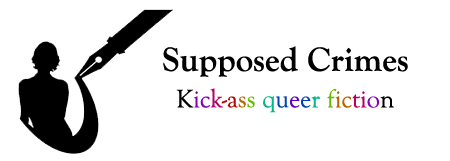
This month, we've been talking about books and subjects that bust binary norms. This can be in the realm of who we love, or it can be in the realm of who we are. Bi-, pan-, and asexuality as well as polyamory tear down the walls of who it's acceptable to love. Books with such characters are still too few and far between. Trans and intersex characters challenge ideas of who we are, and there aren't nearly enough of those, either.
I often find, as both a reader and a writer, that it's difficult to access books with characters and situations which defy binaries. Some of this is the confining nature of book categories. A book might be given specific tags, but in the broader sense, it has to be fit into usually one of two categories (or even a single category).
For example, a romance novel with a bisexual protagonist will be shelved according to the primary love interest's gender identity. A bisexual woman who ends up with a woman? Lesbian fiction. A bisexual man who ends up with a woman? Not even listed as LGBT (as well as being rarer than a unicorn). But what if their partner is neither a man nor a woman? What if they're polyamorous, or there's an ensemble cast, or it's an anthology with a wide range of genders and pairings?
This is the case with some of my books. I have no problem with this, given the limitations of the available categories. However, my bisexual protagonist whose spouse is genderqueer did not end up in a "gay" relationship. Theoretically, it could've been categorized exclusively as transgender, but it still would've needed to be fit into a gay or straight box in the romance department--when it's neither. What about my book with a bisexual main character who is in a polyamorous relationship with a man and a woman? That, too, is neither "gay" nor "straight," even in romance categories.
Just to make this clear, it's a problem with book sellers, not publishers. LGBTQIA+ publishing houses recognize this issue, and it's been an ongoing conversation among authors and publishers. We all want a solution to this! Booksellers, on the other hand, have not quite caught up. For them, it's an issue of marketing and sales. They're not likely to create a whole new category for "stuff that doesn't fit tidily onto shelves" just for the sake of being welcoming. It would take a lot more books before they did that.
It's a problem with consumers as well. Readers are often faithful to their preferred category, and especially in romance, they want to know the endpoint, the primary pairing. If a book is nebulously listed as unspecified transgender or simply as bisexual, that could mean just about anything. For some of us, that's pretty fabulous. For others, not so much. Trust me, I know. There were plenty of complaints that I had too much "heterosexuality" in my "gay" novel (the one with the bi and poly character)!
Which brings me to the last reason this is a challenge. None of this is a serious problem when the book cannot remotely be labeled as a romance. It will be categorized by its genre and, if applicable, the appropriate L, G, B, or T (though, do not get me started on the letters that often get left out). Unfortunately, this is another way in which marketing creates some pressure. There's a tendency for some readers to have the expectation that a romance will be present if the book is identified as LGBT. Authors and publishers alike have to decide how much romance is enough to get the book shelved in a way readers will find it, and then we're back at square one: how to label the book.
While this can seem discouraging, I don't take it that way at all. In fact, this is simply more motivation for me to create stories and characters that defy category. It also drives me to beg authors for books that expand the horizons about who we love and who we are. For now, the best solution is for us to make sure we read and review these books. We need to make sure they're visible, and we can create our own shelves and tags that help readers find them. Use of services like LibraryThing or Goodreads or our own blogs are a great place to start. For example, the Bi-Bliography is a list of books with bisexual characters and themes.
What great binary-busting books have you read? How did you find them?
